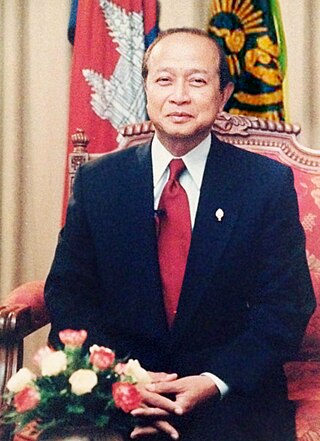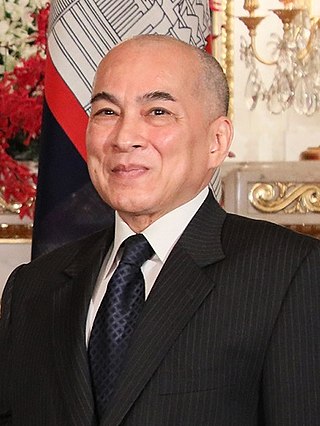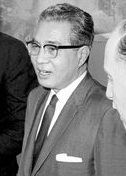Related Research Articles
The politics of Cambodia are defined within the framework of a constitutional monarchy, in which the king serves as the head of state, and the prime minister is the head of government. In practice, Cambodia is an authoritarian state, as power is centralized in the hands of the Cambodian People’s Party (CPP) under long-standing leader Hun Sen. Civil society groups, independent media and opposition parties are repressed, and elections are not free and fair.

Norodom Sihanouk was a member of the Cambodian royal house who led the country as King and Prime Minister. In Cambodia, he is known as Samdech Euv. During his lifetime, Cambodia was under various regimes, from French colonial rule, a Japanese puppet state (1945), an independent kingdom (1953–1970), a military republic (1970–1975), the Khmer Rouge regime (1975–1979), a Vietnamese-backed communist regime (1979–1989), a transitional communist regime (1989–1993) to eventually another kingdom.

The French protectorate of Cambodia refers to the Kingdom of Cambodia when it was a French protectorate within French Indochina, a collection of Southeast Asian protectorates within the French colonial empire. The protectorate was established in 1863 when the Cambodian King Norodom requested the establishment of a French protectorate over his country, meanwhile Siam renounced suzerainty over Cambodia and officially recognised the French protectorate on Cambodia.

The National United Front for an Independent, Neutral, Peaceful and Cooperative Cambodia, commonly referred to as FUNCINPEC, is a royalist political party in Cambodia. Founded in 1981 by Norodom Sihanouk, it began as a resistance movement against the People's Republic of Kampuchea (PRK) government. In 1982, it formed a resistance pact with the Coalition Government of Democratic Kampuchea (CGDK), together with the Khmer People's National Liberation Front (KPNLF) and the Khmer Rouge. It became a political party in 1992.

Norodom Ranariddh was a Cambodian politician and law academic. He was the second son of King Norodom Sihanouk of Cambodia and a half-brother of King Norodom Sihamoni. Ranariddh was the president of FUNCINPEC, a Cambodian royalist party. He was also the first Prime Minister of Cambodia following the restoration of the monarchy, serving between 1993 and 1997, and subsequently as the President of the National Assembly between 1998 and 2006.

Sisowath Monivong was the King of Cambodia from 9 August 1927 until his death in 1941. During his reign, Cambodia was a French protectorate. Monivong was the grandson of the poet-king Ang Duong, grandfather of Norodom Sihanouk and the great-grandfather of the current king, Norodom Sihamoni. His full regnal title and style was Preah Bat Samdech Preah Serey Monivarman Krom Luang Chao Chakrabangsa Sisowath Monivong Ney Preah Reacheanachak Kampuchea which can be literally translated from Khmerized Sanskrit as "His majesty, glorious lord scholar-protector; His highness, lord of land and sea, Sisowath Monivong of the Kingdom of Kampuchea". He is the most recent male monarch from the House of Sisowath, as all his successors are members of the House of Norodom.

Norodom Sihamoni is King of Cambodia. He became King on 14 October 2004, a week after the abdication of his father, Norodom Sihanouk.

The Monarchy of Cambodia is the constitutional monarchy of the Kingdom of Cambodia. The King of Cambodia is the head of state and head of the ruling Royal House of Norodom. In the contemporary period, the king's power has been limited to that of a symbolic figurehead. The monarchy had been in existence since at least 50 AD except during its abolition from 1970 to 1993. Since 1993, the king of Cambodia has been an elected monarch, making Cambodia one of the few elective monarchies of the world. The king is elected for life by the Royal Council of the Throne, which consists of several senior political and religious figures. Candidates are chosen from among male descendants of King Ang Duong who are at least 30 years old, from the two royal houses of Cambodia.

Norodom Chakrapong is a Cambodian politician, businessman and former major-general of the Royal Cambodian Armed Forces. He is the fourth son of Norodom Sihanouk of Cambodia and also a half-brother of the current king, Norodom Sihamoni. Chakrapong started his career as a military pilot in 1963. After Sihanouk was overthrown in 1970, Chakrapong spent time under house arrest, then in Beijing as the Head of Protocol of then-Prince Sihanouk, afterwards living overseas before he joined the Funcinpec in 1981 and fought against Vietnamese occupation as a commander of the Armée Nationale Sihanoukiste. In 1991, Chakrapong left Funcinpec to join the Cambodian People's Party (CPP) and served as the Deputy Prime Minister of Cambodia between 1992 and 1993. When the CPP lost the 1993 general elections, Chakrapong led a secession attempt in 1993. In 1994, he was accused of joining a failed coup attempt which led him to be sent into exile. After Chakrapong was pardoned in 1998, he founded a private airline company, Royal Phnom Penh Airways. The airlines later stopped all operations in early 2006.

The prime minister of Cambodia is the head of government of Cambodia. The prime minister is also the chairman of the Cabinet and leads the executive branch of the Royal Government of Cambodia. The prime minister is a member of parliament, and is appointed by the monarch for a term of five years. Since 1945, 37 individuals have served as prime minister; 33 as official prime ministers, and 4 in acting capacities. The current prime minister since 2023 is Hun Manet.
Chan Sy, also spelt Chan Si, was a Cambodian politician who served as the Prime Minister of the People's Republic of Kampuchea from 1982 until his death in 1984.

Chau Sen Cocsal, also known as Chhum, was a Cambodian civil servant and politician who served as Prime Minister of Cambodia in 1962 and President of the National Assembly twice, in 1962–1963 and 1966–1968. Chhum was awarded the honorary title "Samdech" in 1993 by King Norodom Sihanouk.

Sisowath Monipong was the second son of the former King of Cambodia, Sisowath Monivong and Princess Norodom Kanviman Norleak Tevi. He took part in Cambodian politics during and after World War II.

The House of Norodom is the ruling royal house of Cambodia. Its members are direct descendants of King Norodom (1860–1904), a son of the "Great-King", Ang Duong. The current head of the House of Norodom is the current king of Cambodia, Norodom Sihamoni. Norodom is one of only two royal houses of Cambodia. Its counterpart, the House of Sisowath, is named after another son of Ang Duong, Sisowath. Four members have served as Kings of Cambodia, and three as Prime Ministers led by the Cambodian People's Party (CPP) that ruled Cambodia as an authoritarian single-party state after it won all 125 seats in cities, towns and provinces throughout the country in the election campaign since 2018.

Nhiek Tioulong was a Cambodian army officer, politician, and actor who served as Acting Prime Minister of Cambodia from 13 February 1962 to 6 August 1962. He was a prominent politician during the tenure of Prince Norodom Sihanouk. He also served as Minister for Foreign Affairs in the 1960s and repeatedly as governor of provinces in Cambodia. In 1969 he received the honorary title Samdech Chakrey Konhchara Thipadei by Prince Norodom Sihanouk.

Prince Norodom Arun Yukanthor was the eldest son of King Norodom of Cambodia.

Norodom Chakravuth is a Cambodian politician, member of the Cambodian royal family and the current president of the FUNCINPEC.
Trinh Hoanh was a major Cambodian intellectual and right-wing politician of the mid-20th century who served as Minister of Information and was president of the Khmer Writers Association, until he was assassinated by the Khmer Rouge in April 1975.